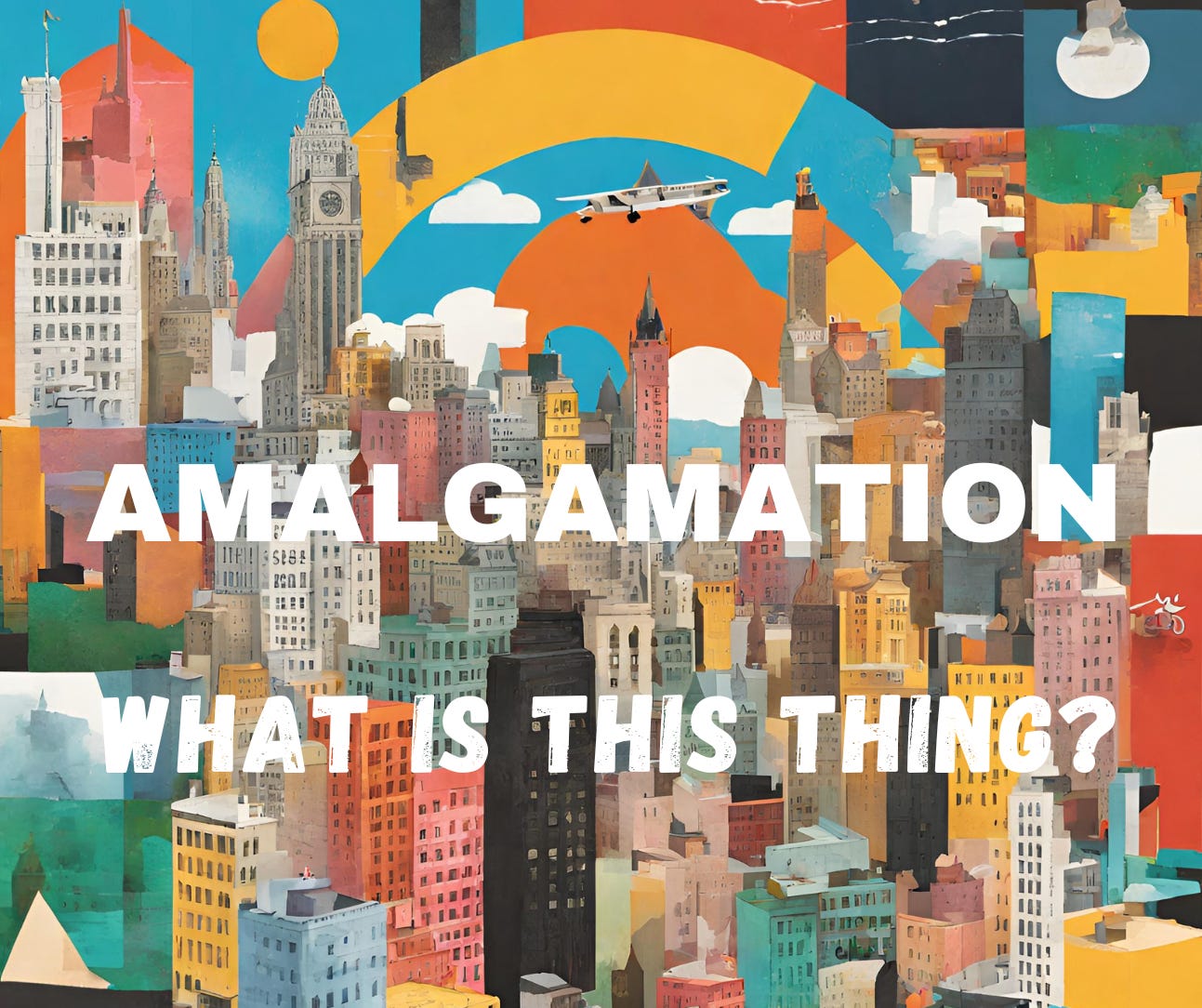We just didn't talk about it at the time. Now it's like the water to a fish, it's so present around us it's hard to see. So what category of thing is amalgamation and big box government in general?
It is capitalist? Socialist? Democratic? Bureaucratic? If it's just efficiency, is that an ideology we need more of? As in the theme of this blog site "All Lines Are Curves", even if some efficiency is a good thing and some cooperation of government is good, is it possible to get too much of a good thing when it comes to bigger and bigger government? Is more always better?
It's time to talk about amalgamation, bureaucracy, and big-box government. To do it, and to make any change happen we’re going to have to put aside old ideas, assumptions, party affiliations, our distaste for politics generally, and a lot of the buzzwords and frameworks that have shaped our thinking and got us here in the first place.
I’ve been following and writing about How We Got Amalgamated and how we got into this Mega City Mess for a while.
As we come up to a transformational municipal election this fall and the 30th anniversary of Amalgamation it’s time to stop and talk about your city. For the older folks, is this what you imagined? Is this what you wanted from your city? For the younger folks, do you see a place for yourself, a clear way forward to prosperity in the changes ahead? Immigrants, students, workers, and entrepreneurs, however you identify yourself, can you see the opportunity and promise ahead? Or do you see the empty and heavy concrete of growth without prosperity?
No matter how much momentum the current plan has, give yourself a break. We’re allowed to stop. We’re allowed to think. We’re allowed to stop and start again if we want to go in another direction.
What is this thing?
Amalgamation, the process of merging smaller municipalities into larger entities, is not merely a structural adjustment; it embodies a complex ideological and operational philosophy. This practice can be challenging to categorize within traditional labels such as capitalist, socialist, or democratic because it encapsulates elements of each, depending on its implementation and outcomes.
At its core, amalgamation is a bureaucratic approach, driven primarily by administrative aims—chief among them, efficiency.
The ideology of efficiency that often drives amalgamation initiatives can be seen as a product of managerialism—a belief system that prioritizes management principles typically seen in private sector businesses, such as cost-cutting, standardization, and centralized control. This approach is ostensibly non-partisan, often presented as a practical solution to the problems of governance.
However, this "practicality" can also reflect a certain ideological slant towards centralization and control, traits commonly associated with bureaucratic governance.
Last week I wrote about The Bureaucratic Party, now by far the largest, best organized, most well-financed, and most influential political party in the country. For them, bigger is always better. More power. More control. More Money. More distance from the front line of humanity. Amalgamation is among their greatest ideological successes.
In the broader discourse of government function, amalgamation, and big government evoke a spectrum of responses. They are sometimes seen as socialist for their centralizing tendencies and emphasis on uniform service provision across large areas, which can imply a redistribution of resources. Other times, they are viewed as capitalist, especially when these mergers are justified by the economic efficiencies they are purported to achieve, akin to corporate mergers in the private sector. However, these changes often occur within democratic frameworks where elected officials and public referendums play significant roles in decision-making, albeit the democratic process may feel diluted to the citizens of newly created mega-cities who experience a sense of remoteness from their governance structures.
Addressing the question posed by the theme of this blog, "All Lines Are Curves," it's pertinent to consider whether there can indeed be "too much of a good thing" when it comes to government efficiency and size. While efficiency in governance is desirable, an overemphasis on it can lead to a reduction in the responsiveness and accountability of government to its citizens. As government grows larger, the risk of losing touch with the localized needs and nuances of its constituent communities increases. This can create a scenario where the government, in its quest to be efficient, becomes overly homogenized and insensitive to the diverse contexts it is supposed to serve.
Therefore, while some level of efficiency and cooperation in government is crucial, an unchecked expansion under the guise of these principles can lead to a diminishment of democratic engagement and the richness of localized governance. The challenge lies in balancing efficiency with other vital democratic values such as responsiveness, transparency, and adaptability. This balance ensures that while government operates smoothly, it remains fundamentally connected to and directed by the needs of the people it serves, thereby avoiding the pitfalls of becoming 'too much of a good thing.'






"The challenge lies in balancing efficiency with other vital democratic values such as localism, responsiveness, transparency, and adaptability".
This statement is about what is not happening out here on the Eastern Shore- we need to challenge the HRM council-which has only 1 representative on it for the ES- and fight for our political and community autonomy.
Having lived here for 28 yrs I was here for the amalgamation- I voted No having lived through a previous one. To lose community autonomy means we live under the umbrella of a larger community-big vs little- the result is often not to our advantage.
We need to take back our autonomy, build our community from the inside out note the outside in.
In my experience it has not served Musquodoboit Harbour and the Eastern Shore well.